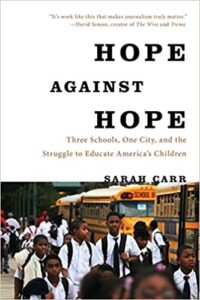About a decade ago, education journalist Sarah Carr noted a dearth of “on the ground” writing on schools. Deciding to rectify that, Carr followed a student, a teacher, and a principal at three different schools in post-Katrina New Orleans for a year. In this EconTalk episode, Carr discussed what she learned in her books, Hope Against Hope, with host Russ Roberts.

1- What does Carr mean when she cites a “false dichotomy” in debates about school reform? What do you think school reform should focus on?
2- Roberts and Carr discuss the variance in standardized test scores before and after Katrina. What lessons does Carr suggest we should learn from this variance? While these scores represent a drastic improvement, what are some elements we should still be concerned about?
3- What were some of the differences between the schools Carr was immersed in that year? What were some of their different strengths? How might New Orleans have better combined the strengths of these different schools?
4- Carr insists that the early post-Katrina charter operators under-estimated the complexity of the task before them. What does she mean? To what extent can and/or should schools be charged with influencing students’ lives beyond the classroom? (Hint- you may find it helpful to refer back to this episode with Paul Tough and this episode with Robert Pondiscio.)
5- What does Carr describe as the biggest lesson(s) she learned from this project? What were your biggest takeaways from this episode?


READER COMMENTS
SaveyourSelf
Jun 10 2020 at 8:37am
What do you think school reform should focus on?
Reading, writing, practical mathematics, statistics, economics, and preventative health. Keyboarding. Other market skills like conflict resolution, making offers, accepting offers, negotiating prices, making appointments, keeping appointments, advertising, making contracts, keeping contracts, saving, borrowing, understanding interest rates, managing risk through diversification, embracing competition as healthy, interviewing, resigning, trial and error, the scientific method, maintaining your tools, different methods for managing “commons”, identifying logic errors, etc. Theories of government. Theories of justice. Increasing parent involvement. Increasing competition. I think I could go on forever with this list.
And, I guess, I’d like all young people to learn the lessons I think are important for my kids: Put away what you’re not using, judge slowly, consider problems from multiple perspectives, don’t be afraid of error, mistakes are inevitable, mistakes are how we learn, guard your freedom jealously, don’t be anyone’s doormat, don’t lie, exercise every day, eat lots of veggies but not so many carbs. Protect your sleep. Protect yourself.
This list really has no end.
Alice L Temnick
Jun 11 2020 at 1:55pm
SaveyourSelf: How I hope you are a teacher! I am. I teach high school economics – with a whole lot of practical life choices modeled at no extra charge! Good teaching is so much more than top-notch content delivery. It’s humbling to think about our valuable roles in society and how much work lies ahead. Your list is terrific.
SaveyourSelf
Jun 12 2020 at 9:54am
Alice L Temnick: My first exposure to economics was in high school! I remember it was like being struck by revelation every day as I learned the models and concepts the course contained. It was a beginner course, but the potential was obvious even then and breathtaking. My teacher wasn’t great, but not terrible either. He gave me a B+ at the end of the class. One of my lowest grades in high school. That made me laugh. That grade still makes me laugh. I love economics. Thanks for reading my post and commenting.
I am a physician by trade. I teach people all day long to keep their back straight when lifting, eat low carb, exercise daily, quit smoking, quit injecting drugs, wear helmets, wear seat belts, wash with soap and water, and get more sleep. Judging by the patient outcomes I’ve observed over time, I am forced to conclude that I am not a very good teacher. My infrequent successes appear to have far more to do with the characteristics of the patient I am talking to than my delivery, style, content, or correctness. The outcomes studies for my whole profession are similarly humbling. So I have great respect for anyone who can nudge the learning curve in a positive direction even a little.
Since you are a professional in the field of education, I’m curious what are some of your ideas for school reform?
Alice Temnick
Jun 23 2020 at 12:29pm
SaveyourSelf :
Yep – you teach for a living as well! I loved your description from high school about how easy economics is to fall in love with (despite your experience with a less than enthusiastic teacher). My ideas for school reform are not radical, nor original, though perhaps somewhat selfish. I want smaller classes so that I can truly help improve student’s writing skills. Thinking well and writing well are invariably connected. Successes, at the margin, can make such a difference for students and their academic future.
Comments are closed.